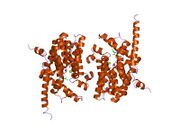Biology:PDE9A
From HandWiki
Short description: Protein-coding gene in the species Homo sapiens
 Generic protein structure example |
High affinity cGMP-specific 3',5'-cyclic phosphodiesterase 9A is an enzyme that in humans is encoded by the PDE9A gene.[1][2]
The protein encoded by this gene catalyzes the hydrolysis of cAMP and cGMP to their corresponding monophosphates. The encoded protein plays a role in signal transduction by regulating the intracellular concentration of these cyclic nucleotides. Multiple transcript variants encoding several different isoforms have been found for this gene.[2]
Inhibitors
- BAY 73-6691
- PF-04447943[3][4]
References
- ↑ "Isolation and characterization of PDE9A, a novel human cGMP-specific phosphodiesterase". J Biol Chem 273 (25): 15559–64. Jul 1998. doi:10.1074/jbc.273.25.15559. PMID 9624146.
- ↑ 2.0 2.1 "Entrez Gene: PDE9A phosphodiesterase 9A". https://www.ncbi.nlm.nih.gov/sites/entrez?Db=gene&Cmd=ShowDetailView&TermToSearch=5152.
- ↑ "Design and discovery of 6-[(3S,4S)-4-methyl-1-(pyrimidin-2-ylmethyl)pyrrolidin-3-yl]-1-(tetrahydro-2H-pyran-4-yl)-1,5-dihydro-4H-pyrazolo[3,4-d]pyrimidin-4-one (PF-04447943), a selective brain penetrant PDE9A inhibitor for the treatment of cognitive disorders". J. Med. Chem. 55 (21): 9045–54. 2012. doi:10.1021/jm3007799. PMID 22780914.
- ↑ "The selective phosphodiesterase 9 (PDE9) inhibitor PF-04447943 (6-[(3S,4S)-4-methyl-1-(pyrimidin-2-ylmethyl)pyrrolidin-3-yl]-1-(tetrahydro-2H-pyran-4-yl)-1,5-dihydro-4H-pyrazolo[3,4-d]pyrimidin-4-one) enhances synaptic plasticity and cognitive function in rodents". Neuropharmacology 61 (4): 665–76. 2011. doi:10.1016/j.neuropharm.2011.05.009. PMID 21619887.
Further reading
- "Identification and characterization of a novel cyclic nucleotide phosphodiesterase gene (PDE9A) that maps to 21q22.3: alternative splicing of mRNA transcripts, genomic structure and sequence". Hum. Genet. 103 (4): 386–92. 1998. doi:10.1007/s004390050838. PMID 9856478.
- "The DNA sequence of human chromosome 21". Nature 405 (6784): 311–9. 2000. doi:10.1038/35012518. PMID 10830953. Bibcode: 2000Natur.405..311H.
- "Generation and initial analysis of more than 15,000 full-length human and mouse cDNA sequences". Proc. Natl. Acad. Sci. U.S.A. 99 (26): 16899–903. 2003. doi:10.1073/pnas.242603899. PMID 12477932. Bibcode: 2002PNAS...9916899M.
- "Identification and distribution of different mRNA variants produced by differential splicing in the human phosphodiesterase 9A gene". Biochem. Biophys. Res. Commun. 301 (3): 686–92. 2003. doi:10.1016/S0006-291X(03)00021-4. PMID 12565835.
- "Identification and characterization of a new human type 9 cGMP-specific phosphodiesterase splice variant (PDE9A5). Differential tissue distribution and subcellular localization of PDE9A variants". Gene 314: 15–27. 2003. doi:10.1016/S0378-1119(03)00733-9. PMID 14527714.
- "Complete sequencing and characterization of 21,243 full-length human cDNAs". Nat. Genet. 36 (1): 40–5. 2004. doi:10.1038/ng1285. PMID 14702039.
- "Crystal structure of phosphodiesterase 9 shows orientation variation of inhibitor 3-isobutyl-1-methylxanthine binding". Proc. Natl. Acad. Sci. U.S.A. 101 (26): 9624–9. 2004. doi:10.1073/pnas.0401120101. PMID 15210993. Bibcode: 2004PNAS..101.9624H.
- "The status, quality, and expansion of the NIH full-length cDNA project: the Mammalian Gene Collection (MGC)". Genome Res. 14 (10B): 2121–7. 2004. doi:10.1101/gr.2596504. PMID 15489334.
- "Towards a proteome-scale map of the human protein-protein interaction network". Nature 437 (7062): 1173–8. 2005. doi:10.1038/nature04209. PMID 16189514. Bibcode: 2005Natur.437.1173R.
- "Cell array-based intracellular localization screening reveals novel functional features of human chromosome 21 proteins". BMC Genomics 7: 155. 2006. doi:10.1186/1471-2164-7-155. PMID 16780588.
- "Specific use of start codons and cellular localization of splice variants of human phosphodiesterase 9A gene". BMC Mol. Biol. 7: 39. 2007. doi:10.1186/1471-2199-7-39. PMID 17090334.


